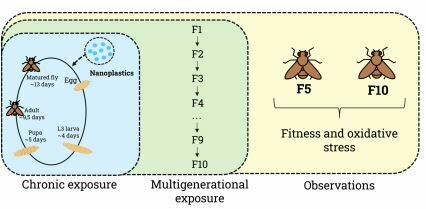Séminaire Ecobio - Chloé Richard (Ecobio)
@ - 14:00

Plastic production and use rise continuously, and its insufficient and inadequate recycling management increase the amount of plastic wastes. Plastic wastes’ alteration can further lead to the formation and accumulation of macro- and meso-fragments, which progressively degrade into micro- and nanoplastics. Their impacts on natural ecosystems are gaining attention, with investigations examining the effects of plastic pollution on aquatic environments and species, and more recently on terrestrial species. However, the toxicity of nanoplastics to insects under continuous exposure through several generations remains understudied. Our study investigated the effects of polystyrene nanoplastics (NP) on the fruit fly Drosophila melanogaster continuously fed with NP-contaminated food at three concentrations (0, 1.05 µg/g, 105 µg/g and 525 µg/g of food) over 10 generations. The effects of NP exposure were measured on the 5th and 10th generations of the fly, from the individual to the physiological levels. Our results showed that NP exposure slightly affected the fitness of the flies, as revealed by the decrease of viability and size at the 10th generation at the highest NP concentration. Moreover, superoxide dismutase activity first decreased at the 5th generation for all NP concentrations, but increased at the 10th generation at 525 µg NP/g food. In conclusion, the results highlighted the toxicity of NP after a long exposure. More studies are needed to fully understand the underlying mechanisms of NP on insects.